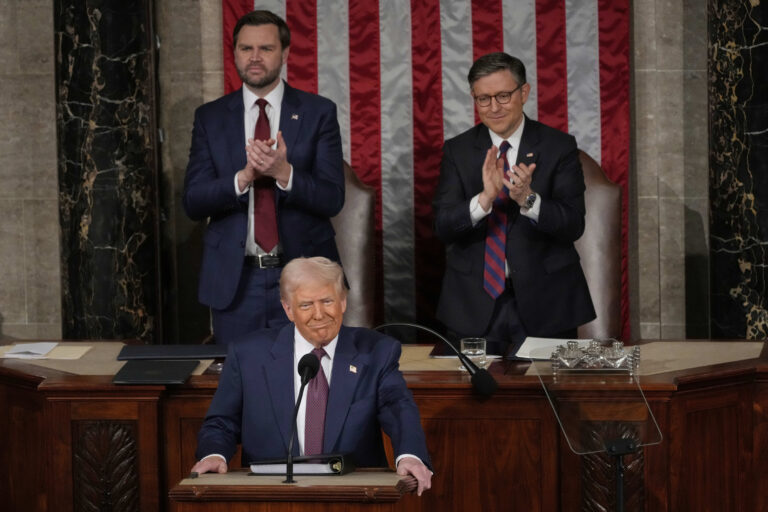 Former New York City Mayor Michael Bloomberg sees an opportunity emerging in presidential politics after Hillary Clinton’s blowout defeat in New Hampshire combined with Donald Trump’s ascension in the tumultuous Republican race.
Former New York City Mayor Michael Bloomberg sees an opportunity emerging in presidential politics after Hillary Clinton’s blowout defeat in New Hampshire combined with Donald Trump’s ascension in the tumultuous Republican race.
But those surrounding the billionaire centrist caution that he’s not rushing to join the fray.
Bloomberg — widely considered a fiscal conservative but social liberal — has taken the first steps to mount an independent campaign. If he runs, he’d be looking to tap interest among middle-of-the-road voters in an election year dominated by candidates rousing support from their parties’ fringes.
But even as Trump and self-described “democratic socialist” Bernie Sanders emerged victorious in New Hampshire Tuesday, Bloomberg’s aides suggested that Clinton’s shortfall may not be enough to compel his third-party run. They point to the upcoming voting states — including South Carolina, Nevada, and the bulk of southern states voting on Super Tuesday, March 1 — which could give the former secretary of state a chance to wage a strong comeback.
If the contest between Sanders and Clinton becomes a drawn out affair, Bloomberg likely won’t have enough clarity on its direction in time for his self-imposed March deadline to make a decision.
Against that murky backdrop, his team will this week commission a new poll gauging Bloomberg’s chances and research ballot access rights in the event of a third-party run, according to a series of interviews with Bloomberg aides and political consultants.
Those who have spoken to the mayor are not certain that a direct challenge to Clinton is likely, as the two New Yorkers have a publicly cordial relationship and Bloomberg once going so far as to float the idea of Clinton as his successor as New York City mayor. But Bloomberg would not rule out running if Clinton was winning.
Bloomberg, a Democrat-turned-Republican-turned-independent worth $37 billion, said himself this week that he was “looking at all the options” as he lamented the current condition of the campaign.
“I find the level of discourse and discussion distressingly banal and an outrage and an insult to the voters,” he told The Financial Times on Monday.
But Bloomberg may soon grow short of time to make a decision.
His staff would need to collect approximately 900,000 signatures to get on the ballot in all 50 states. While many state deadlines are not until the summer, the mayor’s team believes the petition process would need to begin early next month to be completed in time.
If he jumps in, Bloomberg would have to thread the needle very carefully.
The ex-mayor would likely forgo any pretense of a national campaign, punting areas where he can’t compete — like the Deep South — to focus on the coasts and big cities where moderates and independents may be drawn to his fiscal restraint, coupled with gun control advocacy, moderate views on immigration and efforts to combat climate change.
Bloomberg — whom most pundits feel would likely pull more Democratic that Republican voters — could also dip into his vast fortune to blanket the airwaves and internet with ads and bankroll sophisticated voter tracker efforts. He is said to be willing to spend up to $1 billion of his own money on the race and could eschew time-consuming fundraising.
Douglas Schoen, a political consultant and pollster who has worked for Bloomberg said a Bloomberg candidacy would appeal to “the broad mass in the middle who reject the politics of division and who want consensus and results-oriented politics.”
But the obstacles facing Bloomberg are legion.
Bloomberg himself had previously argued that a “short, Jewish, divorced billionaire” would be a tough sell nationally. Liberals may be askance at his close ties to Wall Street and his passionate defense of a New York City police tactic known as stop-and-frisk that a federal judge later deemed discriminatory toward minorities. And conservatives will surely balk at his expansive gun-control efforts and nanny-state initiatives like bans on smoking and giant sodas.
And any third-party candidate would have to overcome the strong structural advantages held by the two main political parties, including generations-deep voter loyalty, the winner-take-all Electoral College and the increasingly partisan electorate.
His advisers worry that securing 270 votes in the Electoral College would be challenging, with so many states seemingly locked in to go Democrat or Republican. The last third-party candidate with any broad appeal was Ross Perot, who landed 19 percent of the popular vote but didn’t win a state in 1992.
(AP)











One Response
Who cares. You want to talk about ego He was a miserable mayor and did less then donkeys